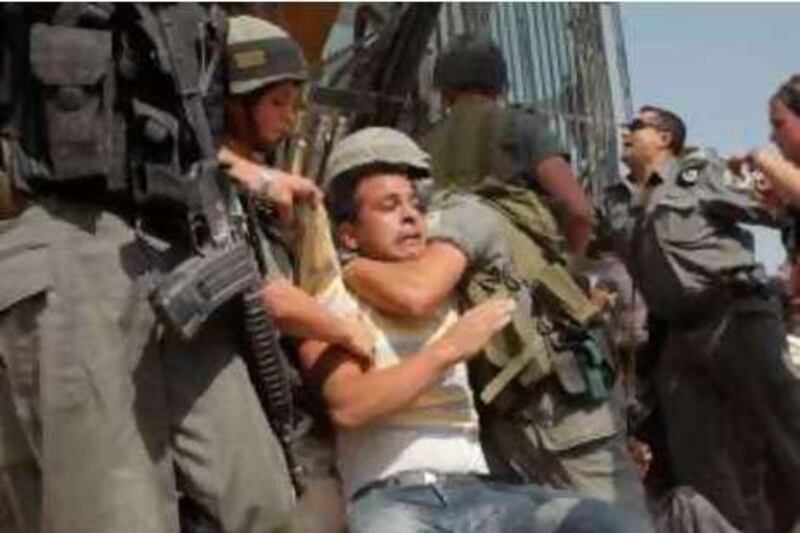TEL AVIV // Jerusalem's police have tapped a controversial figure who had been accused of torturing an Arab detainee and threatening East Jerusalem activists as its new adviser on Arab affairs, drawing condemnation from Israeli-Palestinian legislators and human-rights groups.
The position of Doron Zehavi, a former interrogator for the Israeli military, is considered among the most sensitive on the Jerusalem police force because he will oversee the police's often tense relationship with the city's Palestinian residents. A spokeswoman for the Jerusalem police confirmed the appointment but refused to divulge further details on his duties. Israeli media, which is being officially censored from publishing Mr Zehavi's name because of his former army position, has referred to him as "Captain George", a nickname from his time as an interrogator.
The appointment has already attracted criticism because Mr Zehavi gained notoriety after a Lebanese militia leader who had been captured by Israel accused him in 2004 of systematic torture and sexual abuse. Furthermore, he has been charged by Israel's biggest civil-rights group with threatening to take action against Palestinian activists protesting against the expansion of Jewish settlers in East Jerusalem.
Mohammed Barakeh, a Palestinian legislator in Israel's parliament, said: "The man is an expert in being hostile towards Arabs. This is further evidence that the police are treating Arabs as enemies and not as people with rights." Mr Barakeh added that Mr Zehavi's appointment is part of a growing "racist and anti-Arab" sentiment among law enforcement officials in Israel that has not abated since 13 Arab protestors in northern Israel were killed by police gunfire in October 2000.
Indeed, activists say that police violence against Arabs is being encouraged even by government officials, most recently illustrated when Yitzhak Aharonovitch, the interior minister, pledged to seek a presidential pardon for a policeman charged with shooting dead an unarmed suspected Palestinian car thief. Last year, Mr Aharonovitch, part of the far-right Yisrael Beitenu party, drew headlines after telling an undercover police detective who had apologised for appearing untidy while meeting the minister that he looked like an "Araboosh", a Hebrew slur roughly meaning "little Arab".
Jafar Farah, the director of the Haifa-based Mossawa Centre, which advocates for the rights of Arabs in Israel, said: "It's clear to us that the conditions that existed in October 2000 still exist today in the police system. At the end of the day, you see that there is a police leadership that has a political agenda." Mr Zehavi gained wide media attention in 2004, when Mustafa Dirani, a Lebanese militia leader kidnapped by Israel in 1994 and released in a large-scale prisoner swap with Hizbollah a decade later, filed a lawsuit seeking 6 million shekels (Dh5.8m) in damages for his alleged abuse by military interrogators.
Mr Dirani had told a Tel Aviv court that the Shin Bet security services had kept him naked in an interrogation facility for a month. There six interrogators - including Mr Zehavi, whom he called "George" - questioned him around the clock about an Israeli airman who had gone missing since ejecting from his plane in Lebanon in 1986. Mr Dirani had identified "George" from a photograph he was shown and said he had been "particularly sadistic" towards the captive.
According to Mr Dirani, one day "George" brought into the room a uniformed soldier nicknamed Kojak, who "George" told the Lebanese prisoner would sexually assault him if he did not talk. Mr Dirani said that days later, he was violently sexually abused. After Mr Dirani was released to Lebanon, the Israeli government asked that his case be dropped. While the judge had refused, the case has nevertheless remained dormant since then.
A later video distributed to several Israeli news outlets suggested that "George" may have masterminded the abuse. An unnamed interrogator in the video talked about working with "George" and said: "I remember one instance that I still feel today, which makes me shudder, in which a baton was used - not for hitting. Even in the field, George did what he wanted, in front of my eyes and the eyes of everyone else."
More recently, the Association for Civil Rights in Israel complained in a letter to the Jerusalem police's legal adviser about Mr Zehavi's interrogations of East Jerusalem residents. The letter said that Mr Zehavi had summoned Jawad Siam for questioning and had demanded that Mr Siam shut an anti-settlement activist centre he had opened in the mostly Arab neighbourhood of Silwan. According to the group, Mr Zehavi called Mr Siam a "criminal" and even threatened to destroy additions to Mr Siam's own home - which he had claimed were illegal - should Mr Siam not close the centre.
The group said that Mr Siam's questioning was part of a "worrying" trend in recent years in which East Jerusalem residents were being summoned for "warning" probes in an apparent bid to deter them from taking part in communitiy and political activities. @Email:vbekker@thenational.ae





